
On Freedom Book Summary
Book by Timothy Snyder
Summary
In "On Freedom," Timothy Snyder argues that true freedom is not simply the absence of barriers, but the positive presence of the conditions and capabilities that allow individuals to make meaningful choices, realized through the five interdependent forms of sovereignty, unpredictability, mobility, factuality, and solidarity.
Sign in to rate
Average Rating: 1
Our Bodies Enable Empathy And Knowledge
According to philosopher Edith Stein, recognizing others as having a living human body (Leib) like our own enables empathy. This empathy is essential for gaining objective knowledge about the world and ourselves. Some key points:
- Seeing others as subjects with their own "zero point" creates a new web of understanding
- Empathy allows us to see ourselves as others see us, giving us knowledge we can't gain alone
- Recognizing others' Leib is key to freedom; seeing them just as objects (Körper) leaves us unfree
"We have to see the bodies of others as subjects, because otherwise we cannot see ourselves as subjects. And if we fail to do that, we cannot be free."
Section: 1, Chapter: 1
The Creation Of Capabilities Belongs To Freedom
Edith Stein argued that developing people's capabilities is essential to freedom. Supporting young children's development - through physical contact, trusting relationships, play, and choices - allows them to gain the attributes needed to be free. Since we can't develop these capacities alone as babies, we owe our freedom to others. "The attributes we need to be free individuals are available to us only through coordinated action. Babies can be raised and educated to become free, but babies cannot create for themselves the setting where this is possible."
Section: 1, Chapter: 1
America's History Of Racism Hinders Freedom For All
The author nearly died in a hospital because doctors dismissed a Black friend who advocated for him, showing how racism makes everyone less free. Other examples:
- The National Housing Act of 1934 only guaranteed mortgages for white families, leading to segregation
- The Wagner Act of 1935 allowed unions to exclude Black workers
- Mass incarceration disproportionately imprisons Black men, teaching white people to define freedom negatively as not being arrested
When white people ignore the bodies and perspectives of Black people, they lose key knowledge for their own freedom and survival. Racism leads people to support policies against their own interests.
Section: 1, Chapter: 1
Viewing Freedom Negatively Endangers Public Health
Conceiving of freedom as just the absence of government intervention has dangerous consequences for public health.
To become healthier and freer, Americans should:
- Embrace a positive definition of freedom that includes access to healthcare for all
- Understand how lack of universal healthcare coverage constrains freedom by making people fearful and limiting their choices
- Recognize that a right to healthcare has a basis in early American thought, as Jefferson considered health second only to ethics
- Advocate for policies expanding access to preventive care, maternal health services, vaccines and public health
Section: 1, Chapter: 1
Seeing Others' Humanity
"We have to see the bodies of others as subjects, because otherwise we cannot see ourselves as subjects. And if we fail to do that, we cannot be free."
Section: 1, Chapter: 1
Freedom Requires Generations Of Work
Achieving freedom takes generational effort - no one is born free. The author illustrates this by describing ringing a bell on his family's farm in the 1976 bicentennial. The gravel road, maple tree swing, and the bell itself were all the result of ancestors' labors. The stories and books passed down to him were chosen by others.
While in that moment his choice to jump off the swing and ring the bell felt like an individual declaration of freedom, reflecting shows how it was enabled by a multigenerational foundation. For any person to develop the capabilities to make such free choices requires the work of previous generations in both families and society.
Section: 1, Chapter: 2
Havel's Greengrocer Shows The Power Of Living In Truth
In his famous 1978 essay "The Power of the Powerless," Czech dissident Václav Havel demonstrates how ordinary people can resist a system of oppression through small acts of truth. His example:
A greengrocer hangs a sign in his shop window proclaiming "Workers of the world, unite!" He doesn't believe the slogan, but hangs it to avoid trouble. One day, he stops hanging the sign - a tiny act of defiance. By rejecting the ritual and "living in truth," he exposes and threatens the whole oppressive system.
For Havel, the powerless greengrocer shows that we always have a choice, however small, to act freely. And in those choices lies the power to create change.
Section: 1, Chapter: 2
Recognizing the Sources of Predictability
"To throw our weight in that direction, to become free, we have to recognize the sources of predictability and our vulnerability to them."
Section: 1, Chapter: 2
Unpredictability Arises From Sovereign People Pursuing Values
Unpredictability, the second form of freedom, emerges when sovereign individuals make choices based on their own unique combination of values. Key points:
- Values exist in a "fifth dimension" with its own logic that can seep into our world
- As we choose values over time, we gain the capacity to combine them in new ways
- Every sovereign person constantly faces choices between values in their own unique circumstances
- When sovereign people interact, they generate societywide unpredictability
This human unpredictability keeps us free from those who would oppress us by making us predictable. "Free people are predictable to themselves but unpredictable to authorities and machines."
Section: 1, Chapter: 2
Our Nemesis Predictifies Us
The technologies we increasingly rely on - especially social media algorithms - are making us more predictable and less free. To maintain freedom, we must actively resist this "predictification":
- Recognize that technologies are not neutral, but have purposes that may not align with our values
- Audit how much time we spend on devices and what data we are providing
- Actively choose when to engage and disengage to maintain sovereignty over our attention
- Cultivate "significant roughness" by seeking out art, music, literature and experiences that challenge us
- Gather physically with others to build solidarity and escape the isolation the machine relies on
Section: 1, Chapter: 2
Chance Encounters Spur Unpredictable Creativity
In August 1978, Czech dissidents including Václav Havel hiked to the Polish border for an unplanned meeting with Polish dissidents, where they built a fire, drank vodka and talked. That encounter spurred Havel to write his influential essay "The Power of the Powerless."
Havel was inspired to political action years earlier after the trial of an underground rock band, the Plastic People of the Universe. The Plastic People covering the Velvet Underground connected Havel's thought to Lou Reed, Andy Warhol, and Warhol's Ruthenian immigrant roots.
These webs of unpredictable influence - stretching from Czechoslovakia to Poland to New York City - shaped Havel's key role in the Velvet Revolution. Preserving unpredictability allows such connections and innovations to thrive.
Section: 1, Chapter: 2
America's Founding Relied On Imperial Mobility
America's founding story is deeply intertwined with the age of imperial mobility - the centuries when Europeans, powered by technological and immunological advantages, could conquer and expand globally. Key examples:
- The American Revolutionary War emerged from tensions in the British Empire after the Seven Years' War
- After independence, America expanded rapidly by seizing land from Natives and Mexico, taking the place of European imperial powers
- Southern plantation owners' wealth and political power relied on enslaved African labor
- The Founders had tremendous mobility to settle newly conquered lands, at the expense of Native displacement
Section: 1, Chapter: 3
Mass Incarceration Is A Uniquely American Barrier To Mobility
The rise of American mass incarceration in the late 20th century created a new system of racial control that severely limits social mobility. Consider:
- The US imprisons over 2 million people, the most in the world, disproportionately Black men
- 1 in 3 Black men born in 2001 can expect to be imprisoned, vs 1 in 17 white men
- Spending time in prison severely limits employment, housing, education, and voting rights
Several of the author's incarcerated students liken the "the cell inside" (prison) to "the cell outside" (their home communities) in terms of lack of mobility. Mass incarceration as a deliberate system of racial and class immobilization is incompatible with freedom.
Section: 1, Chapter: 3
Sadopopulism Stokes Division To Protect Elite Wealth
Elites increasingly rely on "sadopopulism" - stoking division and resentment between groups - to protect their wealth and power while immobilizing everyone else. Key tactics:
- Generating a sense of victimhood among a dominant group (whites, men, natives, etc)
- Directing attention and blame toward a scapegoated group (immigrants, minorities, the poor, etc)
- Undermining social programs by framing them as unfairly aiding the scapegoated group
- Promising that the dominant group will maintain relative status over the scapegoated group
Sadopopulism encourages people to tolerate an unfair status quo as long as they can take comfort that others are hurting more. It is an essential tool for maintaining societies with imperially derived concentrations of wealth in a postimperial age.
Section: 1, Chapter: 3
How Fossil Oligarchs Thwart Moral Mobility
Powerful companies, especially in fossil fuels, are using their wealth to prevent society from enacting the changes we need to expand mobility for the next generation.
Climate change affects the poor and people of color first - overcoming the selfish escapism of fossil oligarchs and building a sustainable future is a prerequisite for freedom.
Section: 1, Chapter: 3
The Tragic Echoes of Postimperial Immobility
"Postimperial immobility summoned a tragic echo of the age of imperial mobility. Where once prison inmates were forced to work, now they are forced to do nothing. Where once disease was a tool of empire, now drugs have become a means of self-oppression. Where once guns allowed men to tame a frontier, now they are instruments of self-annihilation."
Section: 1, Chapter: 3
Oligarchs Claiming "Free Speech" For Their Lies Is An Abuse
When powerful oligarchs claim "free speech" to defend their ability to spread disinformation, they are abusing the concept to protect their power. Three key reasons:
- Oligarchs face no personal risk for their speech - they are not critiquing the powerful but embodying power. Free speech exists to protect the vulnerable truth-teller, not the powerful liar.
- Oligarchic speech is often not done by an individual whose body is on the line, but by untraceable networks of anonymous entities and bots. Free speech is for protecting real humans.
- Powerful interests spreading lies through media they control is not "speaking truth to power" but "the powerful suppressing truth." The point of free speech is to allow criticism of unaccountable authority.
Section: 1, Chapter: 4
The Internet's Superabundance Is No Substitute For Local Journalism
Many people access a superabundance of information online today. But that is no replacement for local journalists reporting facts about our own communities.
Most US counties now lack any reporters covering local government, business, schools, environment, etc. The internet tends to recommend national controversy and outrage, not sober local facts. Corruption and abuses of power thrive when no one is watching
The author contrasts the local newspapers ubiquitous in his 1980s childhood with today's "news deserts" that allow disinformation to thrive. A democracy depends on a common factual basis that emerges from the work of gathering and publishing local truths. The demise of local newspapers is an emergency for self-government.
Section: 1, Chapter: 4
Democracy Requires Institutions That Generate And Propagate Facts
For democracy to function, we need more than individual freedom of speech - we need institutions that make facts available to all and give factual speech consequence. Some examples:
- A free press with legal protections and a culture of journalistic ethics
- Independent universities where scholarship can critique power
- Public schools that teach media literacy and critical thinkingLibraries that provide access to reliable informationWhistleblower protections and freedom of information lawsPenalties for fraud, false advertising and libel
Democracy is a system for determining and acting on facts collectively. It cannot function if oligarchs and officials can lie with impunity.
Section: 1, Chapter: 4
Technology Can Expand Factuality - Or Contract It
New technologies can be used to either enable the pursuit of facts - or obscure them in the pursuit of power. Some key positive and negative examples:
Positive:
- The printing press enabling the scientific revolution and a democratization of knowledge
- Telecommunications allowing journalists to rapidly share news
- The internet putting the world's knowledge at our fingertips
Negative:
- Fake images and "deepfakes" portraying events that never happened
- AI algorithms promoting conspiracy theories to maximize "engagement"
To make technology a net positive for factuality, we must consciously shape it through individual choices, professional ethics and democratic oversight. Factuality has to be a human value we encode.
Section: 1, Chapter: 4
Freedom Requires Creating The Conditions For Others' Freedom
The final form of freedom, solidarity, means recognizing our own freedom as inextricable from the freedom of all. As the author puts it:
"To declare oneself free is to promise to act such that others can be free. We must imagine a society of free people and try to build it. Morally, logically, and politically, there is no freedom without solidarity."
Solidarity means moving beyond selfishness and tribalism to uphold freedom as a universal principle. It is the key to making individual liberty a collective reality.
Section: 1, Chapter: 4
Negative Freedom Is Incoherent Because It Rejects Solidarity
The idea of negative freedom - merely getting government out of the way - is incoherent because it rejects the solidarity that makes freedom possible. Consider:
- Many "negative freedom" advocates want to defund public education, making it harder for the next generation to develop capabilities for freedom
- Adherents often reject any redistribution, allowing oligarchic concentrations of wealth to limit most people's economic freedom
- Defenders frequently deny the existence of systemic racism, dismissing the perspectives and experiences of minority groups
In each case, negative freedom assumes that one person or group's freedom is independent of everyone else's. But in reality, we can only be free together in solidarity. Freedom is a collective achievement of humanity that requires ongoing collective effort to sustain.
Section: 1, Chapter: 5
Freedom's Ambition Is Never Complete - But Always Worth Pursuing
The author visits a recently liberated village in Ukraine, where an old woman named Mariia shows him the hardships she has endured under Russian occupation. He reflects:
"The Ukrainian word de-occupation, which she and I are using in conversation, is more precise than the conventional liberation. It invites us to consider what, beyond the removal of oppression, we might need for liberty. It takes work, after all, to get one older woman into a position where she can greet guests and perform the normal interactions of a dignified person. I have trouble imagining Mariia being truly free without a proper house with a chair and without a clear path to the road for her walker.
Freedom is not just an absence of evil but a presence of good."
Section: 1, Chapter: 5
Related Content
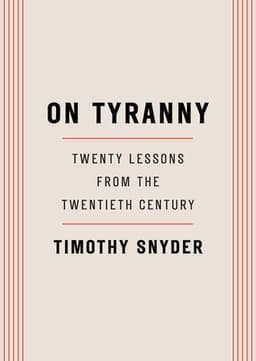

On Tyranny Book Summary
Timothy Snyder
In "On Tyranny," Timothy Snyder draws urgent lessons from the 20th century's bitter experience with tyranny to equip ordinary citizens today with the tools to recognize encroaching authoritarianism and fight back before it's too late.
In "On Tyranny," Timothy Snyder draws urgent lessons from the 20th century's bitter experience with tyranny to equip ordinary citizens today with the tools to recognize encroaching authoritarianism and fight back before it's too late.
History
Politics
Philosophy
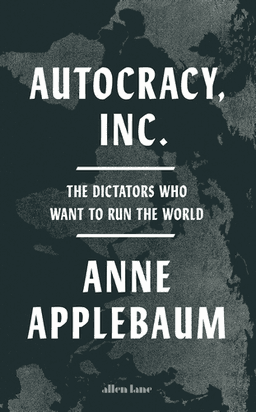
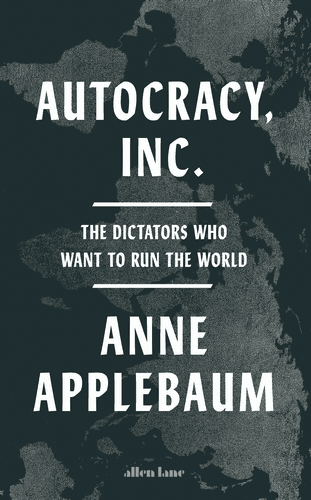
Autocracy, Inc. Book Summary
Anne Applebaum
In "Autocracy, Inc.," Anne Applebaum exposes the global web of dictators and their enablers who have formed a corrupt, mutually-supporting network to undermine democracy, repress their citizens, and rewrite the rules of international politics in their favor.
In "Autocracy, Inc.," Anne Applebaum exposes the global web of dictators and their enablers who have formed a corrupt, mutually-supporting network to undermine democracy, repress their citizens, and rewrite the rules of international politics in their favor.
History
Society
Politics
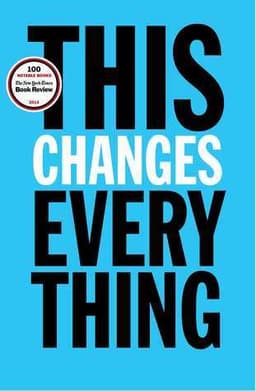
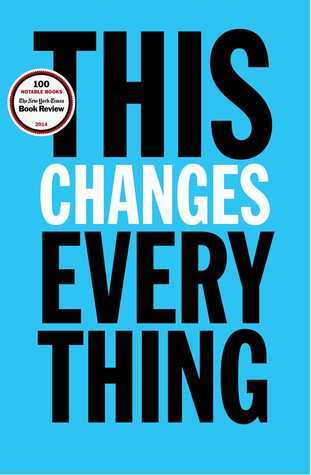
This Changes Everything Book Summary
Naomi Klein
In "This Changes Everything," Naomi Klein argues that the climate crisis challenges us to abandon the core "free market" ideology of our time, restructure the global economy, and remake our political systems - and that in the process, we have the chance to create a safer and more just world.
In "This Changes Everything," Naomi Klein argues that the climate crisis challenges us to abandon the core "free market" ideology of our time, restructure the global economy, and remake our political systems - and that in the process, we have the chance to create a safer and more just world.
Sustainability
Climate Change
Economics
Politics

